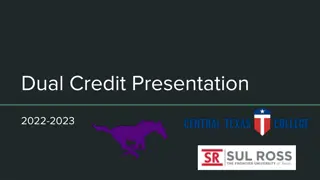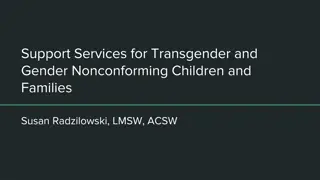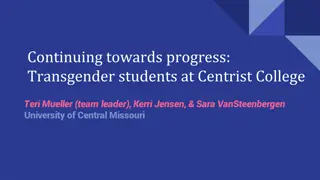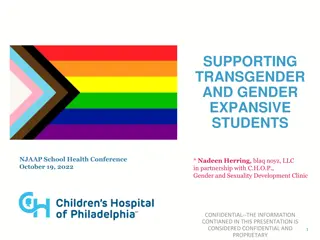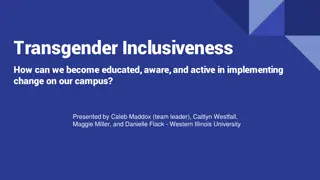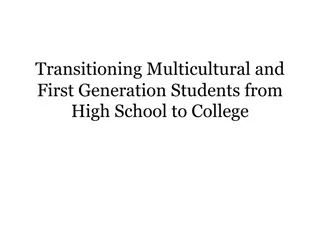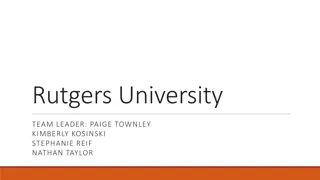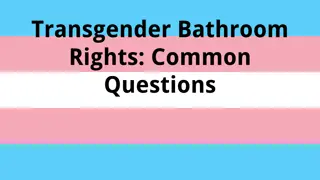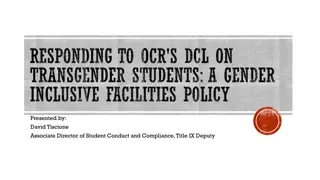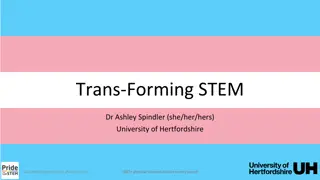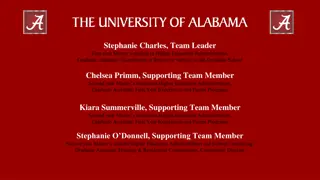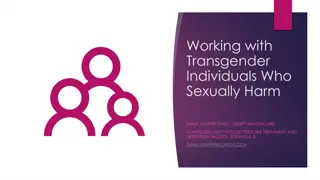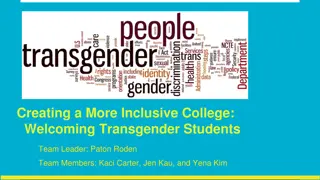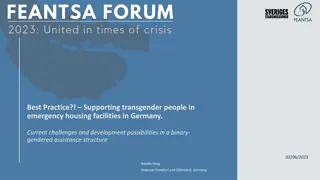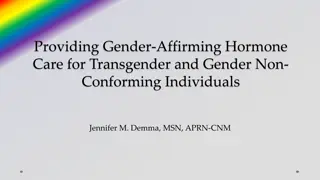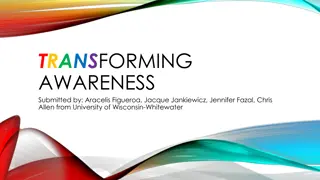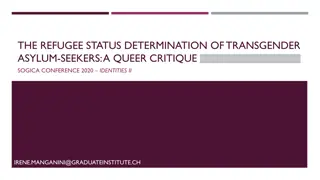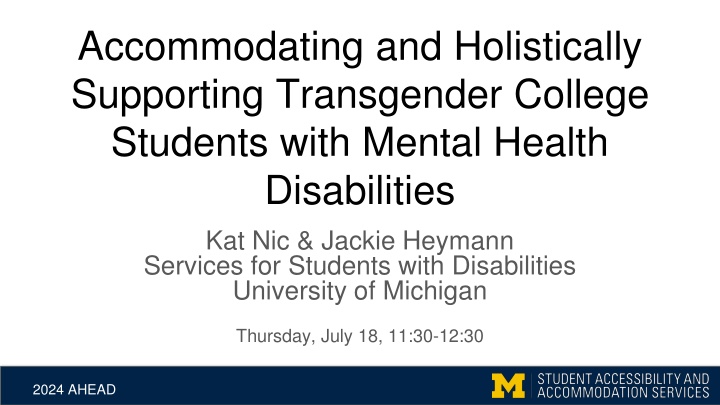
Supporting Transgender College Students with Disabilities in Higher Education
"Learn how to holistically support transgender college students with mental health disabilities in higher education settings. Explore defining terms, historical context, and current challenges faced by these students. Gain insights into promoting equity and well-being for all students, including those at the intersection of transgender and disabled identities."
Download Presentation

Please find below an Image/Link to download the presentation.
The content on the website is provided AS IS for your information and personal use only. It may not be sold, licensed, or shared on other websites without obtaining consent from the author. If you encounter any issues during the download, it is possible that the publisher has removed the file from their server.
You are allowed to download the files provided on this website for personal or commercial use, subject to the condition that they are used lawfully. All files are the property of their respective owners.
The content on the website is provided AS IS for your information and personal use only. It may not be sold, licensed, or shared on other websites without obtaining consent from the author.
E N D
Presentation Transcript
Accommodating and Holistically Supporting Transgender College Students with Mental Health Disabilities Kat Nic & Jackie Heymann Services for Students with Disabilities University of Michigan Thursday, July 18, 11:30-12:30 2024 AHEAD
About The Presenters Jackie Heymann Kat Nic Disability Access Coordinators, Services for Students with Disabilities, UMich
Agenda Learning Goals Defining Terms Theoretical grounding History of pathologizing gender identity Current mental health climate Attacks on transgender and GNC student rights Application to your/our day-to-day work
Learning Goals Participants will leave with a better understanding of the current climate in disability services of accommodating students with mental health disabilities, and the experiences of students at the intersection of both transgender/gender non-conforming (GNC) and disabled identities.
Learning Goals, continued Participants will leave with a better understanding of how mental health is connected to discrimination and societal barriers, and how they can help transgender students with mental health disabilities and how to work with campus partners, both in ensuring students have access to their courses and helping promote equity and well-being for all transgender/GNC students.
Pair & Share What brought you to this session? What are current challenges experienced by transgender or gender nonconforming (GNC) students on college campuses? Challenges faced by students in general Challenges faced by students specifically at your state/at your institution
Defining terms Transgender (trans): someone whose gender differs from their sex assigned at birth Cisgender: someone whose gender identity aligns with their sex assigned at birth Gender nonconforming: someone whose behavior or appearance does not conform to societal and cultural expectations Gender nonbinary: someone who identifies outside of the gender binary
Gender Identity Umbrellas
Important note We explicitly want to note that identifying as trans/GNC is not a disability itself
History of pathologizing gender identity We explicitly want to note that identifying as trans/GNC is not a disability itself However, there is a problematic history and, in some specific areas, a current precedent, of gender identity being treated as a disability or mental illness Historically, transgender identity was frequently seen as a disability or mental illness
History of pathologizing gender identity, cont. Identifying as gay or lesbian was also historically treated as a mental illness In order to receive gender-affirming care, even today, individuals in some locations have to be diagnosed with gender dysphoria, a mental illness
Theoretical Grounding: The Theories Intersectionality Theory: Kimberle Crenshaw (1989) Minority Stress Theory: IH Meyer (2003)
Intersectionality Studies on gender historically focused on white women, privileged by their whiteness; studies on race historically focused on Black men, privileged by their gender. Crenshaw (1989) focused on women of color and how studies on race focused on black men and studies on sex focused on white women, rendering Black women and their unique experiences with both sexism and racism invisible
Intersectionality, cont. Crenshaw posits that marginalized identities are often regarded as separate from each other, and only the privileged portion of the minority is examined, rather than looking at intersections between multiple marginalizations. Intersectionality - hence its name - looks at these intersections of marginalization and the unique challenges brought on by experiencing two forms of oppression at the same time
Minority Stress Theory Minority stress is a type of recurring excessive social stress directly connected to one s, often minority, status, which contribute to high levels of negative mental and physical health repercussions in communities of people with minoritized identities Originally studied in cisgender lesbians and gay men; historically understudied in transgender and GNC youth (Hidalgo et al., 2019). In 2015, Meyer expanded his original theory to include transgender individuals and also to look at LGBTQ+ resilience
The Crossroads between Intersectionality and Minority Stress Theory Testa et al. s (2015) Gender Minority Stress Framework (GMSF) expands on Meyer s original minority stress theory and applies the principles specifically to multi-marginalized transgender and gender diverse individuals in an attempt to explain why trans and GNC individuals have even higher rates of mental health disabilities than cisgender queer individuals The GMSF combines principles of minority stress theory and intersectionality, and places cisgender queer identities as the single marginalized identity while examining individuals who are trans/GNC as the intersection
Current student mental health climate for all students Rates of anxiety, depression and suicidal ideation on college campuses are at an all-time high (NEA) The annual Healthy Minds Study (2023) found: 44% of students reported symptoms of depression 37% reported anxiety disorders 15% seriously considered suicide in the past year
Mental health climate for transgender and GNC students Transgender and GNC students report higher levels of: Depression Harassment Likelihood of engaging in self-harm and attempting suicide Repeated microaggressions around their sexual identities, which can lead to increased hazardous drinking and drug use All forms of sexual and relationship violence in comparison to their cisgender peers
Gender, mental health, and additional identities There is a direct association between the discrimination students experience and their mental health outcomes Experiencing multiple forms of discrimination (ableism, racism, heterosexism, anti-Muslim bias etc.) increases students probability of challenges related to mental health From the 2022 U.S. Trans Survey, more than a third of trans people said they were experiencing poverty; 18% were unemployed; and 11% had lost a job because of their gender identity or expression
Gender, mental health, and additional identities, cont. Students gender identity can also be a point of pride for transgender and gender nonconforming students positive associations with gender diversity can increase mental health outcomes
Mapping Attacks on Trans Rights
Attacks on transgender and GNC rights There are currently 500+ anti-LGBTQ bills in state legislatures throughout the U.S. These bills include, but are not limited to: Public accommodation bans (prohibit transgender people from using the bathroom and locker rooms aligning with their gender) Health care restriction bills (age to access, health care funding, etc) Free speech (bans on drag, book bans) Accurate IDs (forcing use of sex assigned at birth on IDs; making name changes more difficult)
Reflection about your campus What is the political climate like in your state for trans/GNC students? What is the climate for trans/GNC students like at your school? Does it match the climate in your state? How does your office fit into the climate of your school for trans/GNC students? How does your office work with offices that support these students? What practices are currently using in your day-to-day to support transgender and gender non-conforming students?
Our campus policies and practices matter! Impact of diversity, equity and inclusion bans Example: UT-Austin required to shift Gender and Sexuality Center to Women s Community Center Ability for students to indicate their name in use and have that name reflected throughout the university Availability of accessible, gender inclusive housing, restrooms, locker rooms, sports teams
Our campus policies and practices matter!, cont. Availability of gender inclusive campus support services Including in mental and physical health services Representation around campus Hiring practices - internship programs, looking for diversity, modeling
Our personal understanding and culture in your office matters! Take initiative to expand your understanding of different identities, including gender, sexuality, disability, race,etc. Intentionally share resources with students Be intentional to use the name and pronouns students share they want to be use Practice if needed! Familiarize yourself with neopronouns If you mess up, apologize and work to do better next time - do not center yourself; avoid fragility
Services for Students with Disabilities practices Our context at the University of Michigan State of Michigan climate Partnership with the Spectrum Center (LGBTQ center at UM) Participating in resource fairs Increasing awareness of temporary accommodations for gender affirming surgery Ability for students to indicate name and pronouns on our forms Transparency about how names will be pulled for notification letters
Services for Students with Disabilities - Welcome Letter We share the University s preferred name policy in our Welcome Letter Please note, the name used above reflects your preferred (chosen) name in Wolverine Access and is what we use in communications to match what faculty see. This name can easily be updated by using the Spectrum Center Updating Records guide. This guide also includes other useful information. During our welcome meeting, you re also welcome to share a different name with us that you would like to use.
Services for Students with Disabilities - future plans Webpage sharing information about: Name usage Accessible + gender inclusive restrooms Information about support we can provide for recovery from gender affirmation surgery Using social media to convey information Partnering across campus to promote how SSD can support students recovering from gender affirming surgery
Temporary accommodations Reminder: student s gender identity is NOT a disability, but the recovery from surgery is a temporary injury Connect with offices who work with students going through gender affirming surgery to share how our office is a resource for all students recovering from any surgery for temporary accommodations
Breaking into groups States with laws attacking transgender rights Universities who have started to work on holistically supporting transgender disabled students Universities who are just getting started in holistically supporting supporting transgender disabled students
Groups - Spheres of Influence How can you support transgender & gender nonconforming students?
Conclusion: Thank You for Joining Us! Contact Information: Kat: katnic@umich.edu Jackie: heymann@umich.edu
Resources cited ACLU (2024). Mapping Attacks on LGBTQ Rights in U.S. State Legislatures in 2024 Field, K. (2024). What s in a Name? After Texas Banned DEI, a campus space for LGBTQ students got an overhaul. Flannery, M.E. (2023). The Mental Health Crisis on College Campuses. Glossary of Terms, Michigan State University Gender and Sexuality Campus Center Griner, S. B., Vamos, C. A., Thompson, E. L., Logan, R., V zquez-Otero, C., & Daley, E. M. (2020). The Intersection of Gender Identity and Violence: Victimization Experienced by Transgender College Students. Journal of Interpersonal Violence, 35(23/24), 5704 5725. Hidalgo MA, Petras H, Chen D, Chodzen G. The Gender Minority Stress and Resilience Measure: Psychometric Validity of an Adolescent Extension. Clin Pract Pediatr Psychol. 2019;7(3):278-290. Johnson, J. (2010). Recognition of the Nonhuman: The Psychological Minefield of Transgender Inequality in the Law. Law & Psychology Review, 34, 153 164. Kunzel, R. (2017). Queer History, Mad History, and the Politics of Health. American Quarterly, 69(2), 315 319. Lefevor, G. T., Boyd-Rogers, C. C., Sprague, B. M., & Janis, R. A. (2019). Health disparities between genderqueer, transgender, and cisgender individuals: An extension of minority stress theory. Journal of Counseling Psychology, 66(4), 385 395. Meyer, I. H. (2003). Prejudice, social stress, and mental health in lesbian, gay, and bisexual populations: conceptual issues and research evidence. Psychological bulletin, 129(5), 674 697. Pascale, Amanda Blakewood ; DeVita, James M. Transgender College Students Mental Health: Comparing Transgender Students to Their Cisgender Peers. Journal of American College Health, vol. 72, no. 1, United States: Taylor & Francis, 2024, pp. 135 41, doi:10.1080/07448481.2021.2024212. James, S., Herman, J., Durso, L. Heng-Lehtinen, R. (2024). Early Insights: A Report of the 2022 U.S. Transgender Study. Robles, R., Keeley, J. W., Vega-Ram rez, H., Cruz-Islas, J., Rodr guez-P rez, V., Sharan, P., Purnima, S., Rao, R., Rodrigues-Lobato, M. I., Soll, B., Askevis-Leherpeux, F., Roelandt, J.-L., Campbell, M., Grobler, G., Stein, D. J., Khoury, B., Khoury, J. E., Fres n, A., Medina-Mora, M.-E., & Reed, G. M. (2022). Validity of Categories Related to Gender Identity in ICD-11 and DSM-5 Among Transgender Individuals who Seek Gender-Affirming Medical Procedures. International Journal of Clinical Health & Psychology, 22(1), 1 10. Wilson, Laura C. ; Liss, Miriam. Belonging and Loneliness as Mechanisms in the Psychological Impact of Discrimination among Transgender College Students. Journal of LGBT Youth, vol. 20, no. 3, Routledge, 2023, pp. 705 23, doi:10.1080/19361653.2022.2049418.
Additional resources: Disability Visibility edited by Alice Wong Sins Invalid



